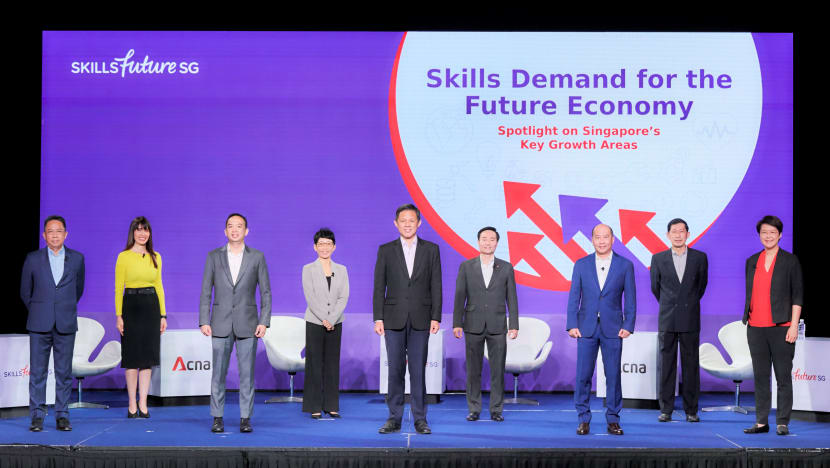The Digital, Care and Green economies: Reshaping Singapore’s business and employment landscape
To thrive in the three high-growth economies, priority skills such as data analysis, carbon footprint management and inclusive practices are vital.

Minister for Education Chan Chun Sing (middle) and guests and moderators at the Skills Demand for the Future Economy Forum. Photos: SkillsFuture, Shutterstock
After working in mechanical parts design for nine years, Mr Qin decided to take on a new challenge, enrolling in a four-month SGUnited Mid-Career Pathways – Company Training GoSchool programme to learn Go programming. Today, his career path has pivoted and he is now a full stack software engineer.
Full stack software engineers are Jacks of all trades who work with clients (the front end) and the server side (the back end) of application development.
The transition from training to working required extra effort on his part, as the tools required by his new job were not always the same as what he learnt. Mr Qin made it a point to catch up on technical coding knowledge at night while learning as much as possible on the job. “Updates and new information appear on the Internet first. If you don’t like to read, or are satisfied with what the school has taught, it will not be enough.”
Mr Qin’s story is just one of several case studies highlighted in SkillsFuture Singapore’s inaugural Skills Demand for the Future Economy report, which aims to be a guide to help Singaporeans identify the skills that they can develop over the next one to three years. It also serves as resource for employers to develop the skills of their workforce.
NEW OPPORTUNITIES IN THE THREE ECONOMIES

The report highlighted three economies that are emerging as high-growth areas – the Digital, Care and Green economies.
The Green Economy is one where enterprises in existing sectors ramp up efforts to achieve sustainable growth through low carbon emissions, resource efficiency and social inclusion, alongside the rise of new green sectors. This is coupled with efforts to advance sustainable development goals like the Singapore Green Plan 2030, which charts targets to meet the nation’s long-term net zero emissions goal.
The Digital Economy comprises a broad range of economic activities that make use of digitised information and knowledge, modern information networks, and information and communications technology to drive production and productivity growth. Technological advancements such as 5G, artificial intelligence and the Internet of Things play key roles in Singapore’s Smart Nation vision, which harnesses technology to effect transformation in health, urban living, transport, businesses and government services.
The Care Economy refers to the jobs and skills needed to support services essential to the nurturing and teaching of current and future populations. While Singapore’s ageing population will require the healthcare, wellness and community sectors to adapt to shifting needs, the COVID-19 pandemic has also accelerated the growth of the Care Economy.
While each growth economy lists different priority skills clusters, some skills clusters can be applied across different economic areas and sectors.
“Companies have to quickly realise that digitalising is no longer an option; it is a necessity,” said Mr Yuen Kuan Moon, group chief executive officer of Singtel, who spoke at the Skills Demand for the Future Economy Forum on Dec 8. “The pandemic has fundamentally shifted everything – the way we work, the way we live and the way we operate. Companies have been forced to transform to catch up with this change in the environment.”
Dr Gog Soon Joo, chief skills officer of SkillsFuture Singapore, agreed, stating that many work processes have been impacted for the better by digitalisation. She added: “There’s also rising concern about how we can grow our businesses without jeopardising our environment, besides the demand created by our ageing population and changing demographics. All these have resulted in great job opportunities for the economy.”
Said Mr Yuen: “As individuals and workers, you might ask, how am I going to take advantage of this? If you look at the SkillsFuture report, there are already 1,100 jobs available in digital task skills alone. The question is – are you ready for that job? The individual must have the mindset of: ‘I am going to learn new skills to be ready for this digital economy.’ Because if I look at the green and care economies, they are driven by technology as well. So, getting the right skills will prepare workers, organisations and the country for the future.”
BEYOND TECHNICAL SKILLS
Beyond developing deep technical skills, equally important is the development of critical core skills – like the ability to keep abreast of developing trends, technical skills and being effective at interacting with coworkers. Such skills make it easier to integrate knowledge across disciplines.
Mr Robert Chong, chief corporate and human resources officer at Sembcorp Industries, said at the forum that while technical skills can be taught, the lack of soft skills is far more worrying. “People come in without soft skills but in the workplace, you don’t often work alone – you work with people. I think they (tech skills and soft skills) come hand in hand, along with the need for a positive mindset that is prepared to take risks and make changes.”
Dr Gog pointed out the importance of being aware of one’s existing skillset and identifying any gaps. Having conversations with supervisors to understand job role expectations is also important to plugging those gaps: “Workplaces are the best place to develop critical core skills, which is why SkillsFuture Singapore is working with the National Centre of Excellence for Workplace Learning to help all workplaces to develop the capability to train their staff in soft skills.”
She highlighted the example of Ms Eliza Chin, a former journalist who assumed the role of executive director in the social services sector and found that her existing soft skills were transferable: “As a journalist, she knew stakeholder engagement, she knew how to communicate and she knew how to create promotional material. She also knew that she had to learn how to raise funds and how to do clinical interventions, so she reached out to the Social Service Institute for courses that she could enroll in.”
Like Mr Qin and Eliza, workers who want to identify their skills gaps can also make an effort to read up. Resources like the Skills Demand for the Future Economy report are a good starting point for those wishing to embark on skills development – a journey that rewards both employees and employers in the long run.
Download the Skills Demand for the Future Economy report to find out more about how economies are changing, and the resources available to help workers adapt and grab these new opportunities.















